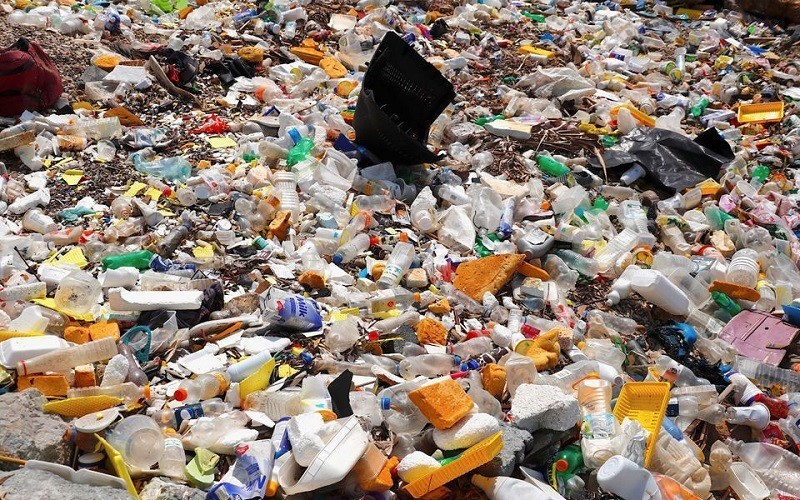Tackling plastic pollution is the message chosen by the United Nations Environment Programme (UNEP), as the theme of World Environment Day (June 5) 2023. The call to protect the planet from this dangerous threat comes as countries are promoting negotiations to reach an agreement to combat plastic pollution by 2024.

Large amounts of rubbish made from plastic can be seen washed-up on the shores of the harbour at Port Moresby, Papua New Guinea, November 19, 2018. (Photo: REUTERS)
In a message sent to the talks held in Paris from May 29 to June 2, French President Emmanuel Macron stressed, “plastic pollution is a time-bomb and at the same time already a scourge today”.
Indeed, the world is suffering from unsustainable consumption and production of plastics, inefficient waste treatment and recycling.
According to the UNEP, about 460 million tonnes of plastic have been produced each year. This number could triple by 2060. Worryingly, about two-thirds of the plastic produced annually was released into the environment after being used once or a few times, while less than 10% was recycled.
Scientists warned that most plastic waste does not decompose for decades, even hundreds of years. Meanwhile, eroded plastic materials will exist as microplastics that are absorbed by fish and many other organisms, thereby quickly entering the global food chain.
Many recent studies showed that microplastics exist from the deepest seabeds to the highest peaks like Everest. In the human body, microplastics were detected in blood, breast milk and placenta.
A study by the 5 Gyres Institute (the US) shows that the amount of plastic waste dumped into the oceans around the world has increased dramatically since 2005. In 2019, about 171,000 billion microplastics were floating in the heart of the oceans and this number could triple by 2040 if the world does not act more aggressively.
The above figures paint a gloomy picture of plastic pollution in the world today. Executive Director of the UNEP Inger Andersen stressed, that the habit of throwing away plastics has been seriously polluting the environment, suffocating the Earth's ecosystems, increasing climate change and harming human health.
According to UNEP research, the production and use of plastics can emit 19% of greenhouse gases by 2040. This is a major obstacle that can prevent the world from realising its commitments in the Paris Agreement on limiting global warming to 1.5 degrees Celsius, above pre-industrial levels.
To protect the Earth from the dangers of plastic pollution, in March 2022, the United Nations agreed to start negotiating the first international treaty on plastic pollution.
The recent Paris talks mark the second of five stages of negotiations, that are expected to lead to a historic agreement on the production and use of plastic products and the treatment of plastic waste. The negotiation attracted thousands of delegates from 175 countries and more than 1,500 scientists and representatives of businesses around the world.
According to the plan, the next stages of negotiations will be held in 2023 and 2024, before the agreement is approved in mid-2025.
At the recent negotiation session in Paris, relevant parties discussed regulations such as banning single-use plastic products, limiting the use of certain chemicals, cutting production and consumption, and increasing producers’ responsibility. Although there are still differences in the goals and ambitions of each country, analysts said that the negotiations have reaffirmed the determination to build a legally binding international agreement, to prevent one of the most serious environmental disasters on the planet.
The UNEP Executive Director Inger Andersen emphasised, that the international community is facing a "once in a thousand years" opportunity to unite and agree on the necessary regulations, to prevent plastic pollution at the global level. Calling on the world to strengthen the implementation of measures to reuse and recycle plastics, and promote the production of alternative materials, the UNEP affirmed that these efforts will help reduce 80% of annual plastic pollution by 2040 and reduce 50% of single-use plastic products, thereby contributing to protecting the environment and people's health.
Tien Dung - Translated by NDO